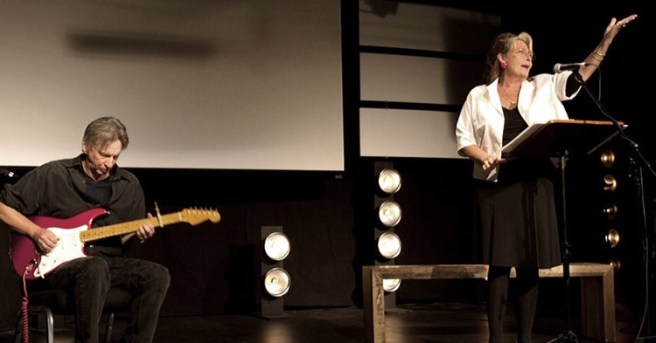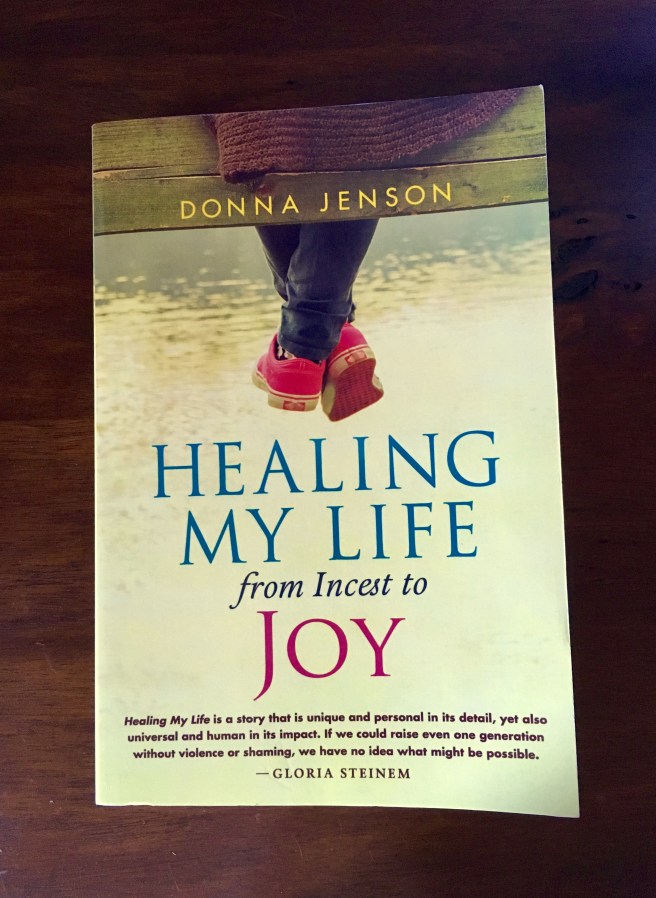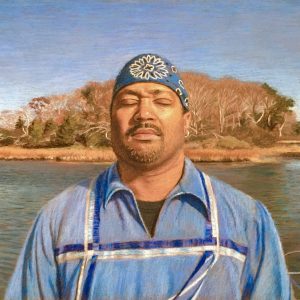Not long ago I sat in a cozy livingroom curled up on the couch next to a wood stove, surrounded by a view of mountains that I cannot even describe. I was chatting with Donna for the first time, but I already knew her life story. I had just finished her book so I had a deep respect for the journey she had made in her life to arrive at this point. What I’ve learned from Donna is that there are healers all around us–our friends, lovers, peers and practitioners of all kinds who are just waiting for us to find them and to allow them into our lives:

I am more than a woman who survived the childhood sexual abuse of incest. I am a writer. In my lucky hours time is suspended and I get lost in my words, swimming between my thoughts and feelings discovering just the right phrase, watching a delicious sentence form herself through my pen. It’s a joy that is mighty hard to describe, this act of expressing myself.
Express is the opposite of repress. And I spent an enormous amount of time and energy repressing all kinds of memories and feelings about the incest – all caused by my father’s harm and my mother’s inability to protect me. My creative spirit was imprisoned deep inside that repression. Understand, the holding back of pain and awareness was nothing short of a way to survive, a way to live as ordinary a life as possible. But in my third decade here on earth I came to know that I had to remove the boulder of protective repression holding down all that pain so I could get it out of me – drain it and get down to the mud where the lotus of my creativity could finally bloom to her fullest.
I’ve been a part of a writer’s community where I live, in Western Massachusetts, for twenty years, basking in a circle of sister writers sharing their creativity and welcoming mine. Every Thursday morning our ritual of gathering together fosters everyone. Often I say, “I love ‘us’!” Being in this community has been an enormous help for writing my play and my book plus it is a treasured place of belonging which fuels continued creativity.

Amy asked, “What did you love when you were a kid?” The first memory that surfaces isn’t even mine; it’s my mother’s. She loved telling the story of how I would run into the ocean and tumble in the waves soon after I learned to walk. “You were like a little seal playing at the beach,” was always her closing line of the story.
The beach was on a naval base in Guam. My dad was stationed there at the close of WWII. Mom and I joined him there when I was eight months old. Mom and I lived the start of my life (gestation through the eighth month of babyhood) with her family on Gram and Gramps’ farm. That’s what I knew, all that I knew – a peaceful harmonious family cocoon in eastern North Dakota.
Mom and I entered Guam wrapped in a cloud of innocence to find a violent drunk in our Quonset hut. He would stay that way for sixteen years until Alcoholics Anonymous wrung the booze out of him. But he retained his meanness and abusive nature till the day he died when I was forty-six.
I’m struck by my mother’s recall of the joy I showed on that beach in Guam. How confused I must have been, little me, certainly bereft of my first home as well as stunned by the chaos that was my father. It brings me to imagine (because I can never know for sure) that it was the beach and the tumbling in the ocean waves that served as a respite for my tiny self. Clearly this experience was imprinted in my very cells because whenever escape is warranted from work or life, it’s the beach, the ocean, I long for and do all I can to get there.
Amy also asked, “What unpleasant experiences are you able to handle?” Ah, well, you really should get my book for the full Monty on that. After decades on a healing path I’d say what I’ve come to be able to handle is the negative reactions people sometimes have upon learning about my experience of surviving incest. It took years to even say it out loud because, first of all, for a long time, I could barely handle hearing my own voice saying it, telling it.
One remarkable response came from the wife of a prominent statesman – they were both Italian as was my “then” husband. She and I were members of the Commission on the Family in NY. It took weeks of counseling and practice to get up the nerve to tell her – thinking I’d gain some gravitas to put some ideas forward in the Commission about violence in the family. When I said, “I’m an incest survivor,” she reached over, laid her hand on my forearm and asked, “You’re not Italian, are you?” I think I gasped a bit as I shook my head saying, “No, my husband is.” That was the extent of our conversation, forever.
This happened way back in 1975 so, okay, I figured there was a long way to go. But here we are in 2018 and I’m speaking with a book club that had read my book, Healing My Life from Incest to Joy. A woman sitting across from me is alternately clutching my book to her chest or laying it down on her lap, slapping her hand on it saying, “It makes me so angry.” And there I was, asking, quite calmly, “What do you think the anger is about?” All she could say was, “I don’t know.” The conversation moved to around the circle but looped back to the angry one who said, “You know, I think the anger is fear.” And I asked, “Do you know what the fear is about?” She cast her gaze onto the carpet in front of her and said, “Haven’t a clue.”

Then there’s what I call the “veiled” response. Sometimes when I disclose to someone a thin opaque veil seems to close over their eyes – like they’re checking out from the conversation. Clearly, we’re done.
The flip side of these encounters is when I’m approached by someone who’s read my book or blog or seen my play and says, “This is my story.” Or “I never told anyone, but I’m a survivor.” Or “Thank you for what you’re doing this happened to my sister (or daughter, or brother, or wife, or, or, or…).
And here’s what I say first when someone discloses to me, “I’m sorry that happened to you.” Second is usually, “Thank you for telling me.” Because when a survivor is believed, their world can begin to feel safer and that can free up all kinds of creativity.
Donna Jenson founded Time To Tell in 2009 with a mission to spark stories from lives affected by incest and sexual abuse to be told and heard. She wrote and performs her one-woman play, What She Knows: One Woman’s Way Through Incest to Joy, which is based on her own experience of surviving incest and what she did to make her life worth living. She performs her play at conferences, for organizations focused on boys who have sexually abused others, girls in prison, college students, domestic violence and sexual assault advocates, and communities in need of healing. She leads Time To Tell What We Know writing and mindfulness workshops for survivors. Donna is a leader, counselor and organizer who built grassroots women’s centers in New York City during the 1970’s and 1980’s and is still active in the leadership development consulting and training practice she established in 1986. Her book, Healing My Life from Incest to Joy, is a narrative of the choices she made and experiences she had that helped her heal from her childhood trauma. Donna lives in Western Massachusetts on a hilltop with her husband and their dog Bella. Learn more about Donna’s work here.
To receive I Am More updates by email, enter your address on the right side of the blog.

This is such a complex story. I applaud Donna for being able to write her book and being able to work with other people with similar issues. I am a believer that there is help in sharing with others. May you be blessed with kindness! Thank you for allowing us to enter your world and words.
LikeLiked by 1 person